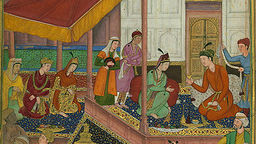Non-Monogamy: A Surprising Perspective from a Muslim Matchmaking Service

“Muslim Marriage Events” is an initiative in the UK to “tackle the problems in searching for a spouse in an Islamic framework.” They hold mixers and other matchmaking events, sometimes targeted to specific slices of the Islamic community (ie, widowers, Pakistanis, or age-targeted events). At these events, they always have a “Muslim scholar on hand to answer marriage related questions.”
The events charge what the promoters see as a modest fee, to cover the cost of a three-course buffet. “Bearing in mind the average Muslim wedding cost,” the site advises, they consider it a “great value.” Participants at the events are allowed to bring a “mahram/chaperone” along—sort of the equivalent of a wing man, I guess. They usually sit in the back. An FAQ section at the Muslim Marriage Events site anticipates a humorous query: “Will there be segregation?” “No,” they answer firmly. “The aim of the event is to meet a prospective marriage partner, and the only way to achieve this is by face-to-face meetings.”
Increasingly, the organizer of these Muslim Marriage Events is getting interesting requests—from successful, career-oriented Muslim women in the UK, who would like to become second wives to already-married Muslim men.
I learned this on a BBC “World Service” radio story last week, which caught my ear, but their site is disorganized and I can’t find the link to it anywhere.
Mizan Raja, who organizes Muslim marriage events, says that in the past six months he’s had hundreds of calls from career women wanting to be second wives. He commented that the demand for these relationships is initiated and led by the women, not the men.
Multiple marriages are allowed under Sharia law, and in these cases, as the BBC story noted, for as much as we perceive polygamy as about the “control” of women (presumably more so than monogamous marriages, according to the romantic ideal?) and non-monogamy a tomcatting dream of the rogue husband, it’s women who are seeking what the story called a “part-time share” in a husband.
There are a few reasons for this perhaps counterintuitive non-monogamous initiative, and tolerance. The UK is facing something of a “Muslim Spinster Crisis,” as it’s been called. Women in their 30s and 40s face a dearth of willing, available, suitable candidates for marriage. Women far outnumber men at some matchmaking venues.
These career women who approach Muslim Marriage Events with requests to become second wives want the intimacy, warmth and sexual fulfillment of marriage, this story explained, but they don’t need financial support from their husbands, nor do they need a husband to give them a social status or standing. And they have enough going on in their lives, presumably, that they don’t feel as if they must lay exclusive claim to the husband. So, they don’t mind sharing.
I really enjoyed listening to the guest, because he exuded a very light, open-minded attitude about non-monogamy, and, frankly, in a place where I guess I was surprised to hear it. Who are we to say that monogamy is the only thing that works, he laughed. I’m paraphrasing, but that was the gist. He was unconcerned with jealousy and all the other familiar objections to the idea. He noted that some of the women seeking mates would like to reconnect with their “femininity” and have a nurturing sexual and personal relationship, to complement their successes in other spaces.
I learn in another article that according to the Koran, if a man can’t treat his wives “fairly, justly and equally then he can only marry one. Also, comments Sheikh Ibrahim Mogra, “the moment it becomes secretive, or you start treating one less well than the other,” then you’ve violated the Koran’s standards. Multiple marriages aren’t valid if done “purely…for sexual gratification.”
I wouldn’t have expected to hear, first, that Islamic women were initiating requests for non-monogamous, multiple marriage, or that a statement on the plausibility of and tolerance for non-monogamy would come from a matchmaking service that has Islamic scholars in residence at its events.
Things are more possible, and complex, on the ground level than in our imaginations or our firm beliefs about marriage.




